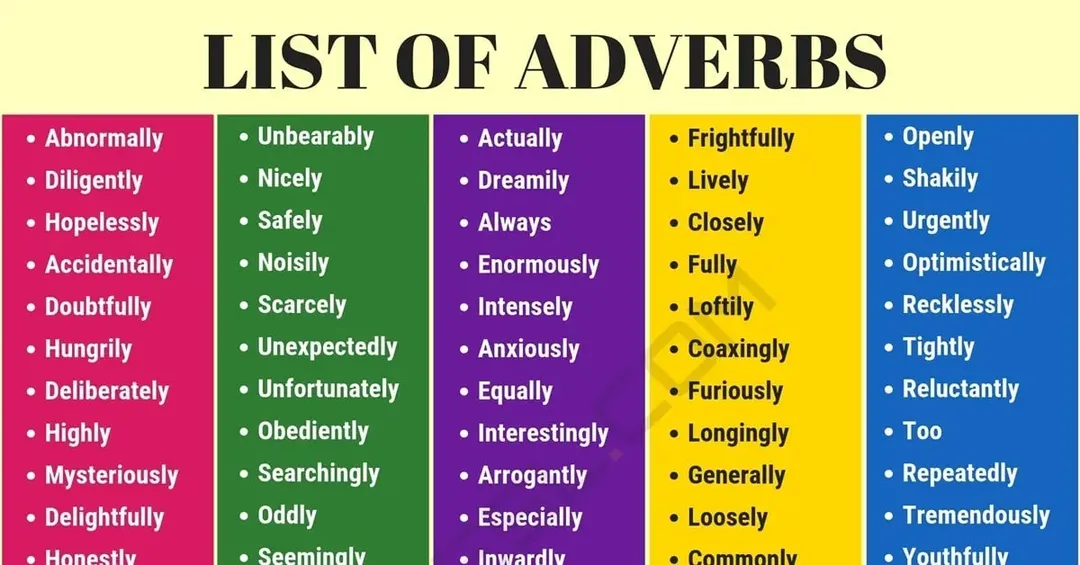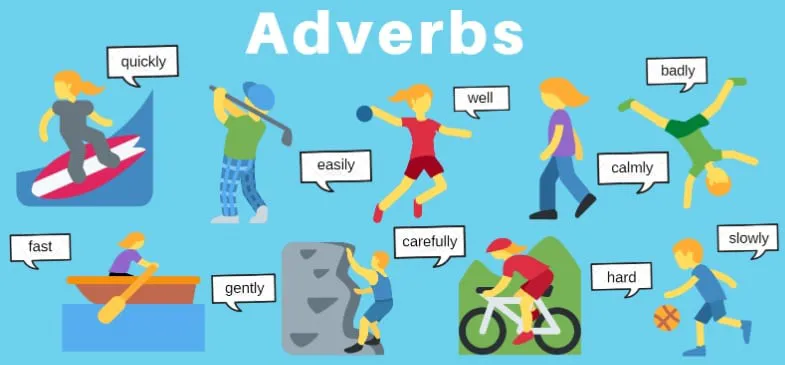
1. Các mệnh đề trạng ngữ phổ biến
1.1 Mệnh đề trạng ngữ chỉ mục đích (Adverbial clauses of purpose)
Mệnh đề trạng ngữ chỉ mục đích thường bắt đầu bằng các từ sau đây:
So that: để
In order that: để
For fear that: sợ rằng, thường được theo sau bởi should.
In case: phòng khi
1.2 Mệnh đề trạng ngữ chỉ nguyên nhân (Adverbial clauses of cause)
Mệnh đề trạng ngữ chỉ nguyên nhân thường bắt đầu bằng các từ sau đây:
Because: vì
As: vì
Since: vì
Seeing that: vì
E.g: Seeing that you won't help me, I must do the job myself.
1.3 Mệnh đề trạng ngữ chỉ nơi chốn (Adverbial clauses of place)
Mệnh đề trạng ngữ chỉ nơi chốn thường bắt đầu bằng các từ sau đây:
Where: nơi (mà)
E.g: I will go where you tell me.
Wherever: bất cứ nơi đâu
E.g: Sit wherever you like.
1.4 Mệnh đề trạng ngữ chỉ thời gian (Adverbial clauses of time)
Mệnh đề trạng ngữ chỉ thời gian thường bắt đầu bằng các từ sau đây:
When: khi
E.g: When it rains, I usually go to school by bus.
While: trong khi
E.g: I learned a lot of Japanese while I was in Tokyo.
Before: trước khi
E.g: She had learned English before she came to England.
After: sau khi
E.g: I came after he had left here.
Since: từ khi
E.g: I have taught here since I graduated from university.
As: khi
E.g: As I was a child, I used to go swimming.
Till/ until: cho đến khi
E.g: I'll stay here till/ until you get back.
As soon as: ngay khi
E.g: As soon as John heard the. news, he wrote to me.
Just as: ngay khi
E.g: Just as he entered the room I heard a terrible explosion.
Whenever: bất cứ lúc nào
E.g: I will discuss it with you whenever you like.
1.5 Mệnh đề trạng ngữ chỉ cách thức (Adverbial clauses of manner)
Mệnh đề trạng ngữ chỉ cách thức thường bắt đầu bằng các từ: as (như), as if (như thể là), like (như)
E.g:
- Do it as I've told you.
- It looks as if it's going to rain.
1.6 Mệnh đề trạng ngữ chỉ kết quả (Adverbial clauses of result)
Mệnh đề trạng ngữ chỉ kết quả thường bắt đầu bằng các từ sau:
- So + adj/ adv + that: đến nỗi mà
E.g: The coffee is so hot that I cannot drink it.
- Khi tính từ là much/ many, có thể có danh từ theo sau:
E.g: There was so much noise that we couldn't hear him.
- Such (a/an) + N + that: đến nỗi mà
E.g: It was such a hot day that I took off my jacket.
1.7 Mệnh đề trạng ngữ chỉ sự nhượng bộ (Adverbial clauses of concession)
Though/although: mặc dù
E.g: Although John tried hard, he was not successful.
No matter: dù cho....đi chăng nữa, có ý nghĩa tương tự như (al)though được theo sau bởi how, what, where, who.
- No matter how = however
- No matter who = whoever
- No matter where = wherever
- No matter what = whatever
E.g:
No matter how/ however fast he ran, his brother arrived first.
(Dù cho anh ta có chạy nhanh bao nhiêu đi nữa, anh trai của anh ta củng đến trước tiên.)
1.8 Mệnh đề trạng ngữ chỉ sự so sánh (Adverbial clauses of comparison)
Mệnh đề trạng ngữ chỉ sự so sánh bắt đầu bằng "than, as .. .as, as"
E.g: He speaks English as fluently as his father.
1.9 Mệnh đề trạng ngữ chỉ điều kiện (Adverbial clauses of condition)
Mệnh đề trạng ngữ chỉ điều kiện bắt đầu bằng "if" và "unless"
E.g: If I were you, I would go to France with him.
2. Một số bài tập vận dụng
Bài 1: Find the adverbial clause in each sentence.
1. When I delivered the newspaper, I saw Mrs. Sampson at the window.
2. Because that clerk was so helpful, I praised her to the store manager.
3. You may play outside until it's dark.
4. He becomes nervous when he speaks in public.
5. Please visit us whenever you are in New York.
6. Nero fiddled while Rome burned.
7. The movie was just beginning as we bought our tickets.
8. She can swim better than Bob can.
Bài 2: Choose the correct answer in brackets to complete the sentences
1. _______ he always did well on his English tests, his parents were not surprised that he got an A. (When / Since)
2. You should keep the milk in the refrigerator _______ it wouldn't go bad. (since/ so that)
3. _______ he thinks he's smart, he isn't. (Although/ After)
4. You should say goodbye to your brother _______ you leave for Europe, (before/ since)
5. _______ my father has high blood pressure, he has to watch what he eats. (Before / Since)
6. _______ I came to this country, I hadn't spoken a word of English! (Before/ Since)
7. I'll let you know _______ I come back, (because / after)
8. He doesn't understand _______ he doesn't speak French very well, (so that / because)
9. He spoke slowly _______ she would understand, (because / so that)
10. _______ you stop crying, I'll buy you an ice cream. (If / Since)
Bài 3: Find out the adverbial clauses in the following sentences and state the kind of each.
1. Even if it rains, I will come.
2. When you have finished your work, you may go home.
3. You can put it wherever you like.
4. I did not buy that watch because it was expensive.
5. You must go whether you hear from him or not.
6. He spoke in such a low voice that few people could hear him.
7. Since you have apologized, we will take no further action against you.
8. I have not been well since I returned from the hills.
9. He was so weak that he could not stand.
10. As he was not there, I spoke to his mother.
Bài 4: Choose the best answer.
1. The flight was delayed _______ the fog
A. in spite of
B. because of
C. though
D. since
2. Huong didn't participate in the contest _______ her lack of confidence.
A. because
B. because of
C. since
D. despite
3. He hid that letter in a book _______ no one could read it.
A. so that
B. because
C. although
D. in spite of
4. _______ Nam was unable to see anything, he knew someone was in his room
A. Because
B. In case
C. if
D. Even though
5. The mother got angry because _______.
A. her son behaved badly
B. her son's bad behavior
C. her son will behave badly
D. her son bad behaving
6. He lost his job _______ his laziness.
A. due to
B. in spite of
C. despite
D. because
7. _______ the liberation of women, women can take part in social activities.
A. Because
B. Thanks to
C. While
D. As
8. She decided to leave her job in the company _______ she could earn a lot of money there.
A. because
B. although
C. despite
D. since
9. In spite _______, the football match was not cancelled .
A. the rain
B. of the rain
C. it was raining
D. there was a rain
10. _______ he had enough money, he refused to buy a new car.
A. In spite
B. In spite of
C. Despite
D. Although
Bài 5: Choose the best sentence that is closest in meaning to the given one.
1. The children laughed a lot because of the funny story.
A. The children laughed a lot because the story is funny.
B. The children laughed a lot because of the story funny.
C. The children laughed a lot because it was funny.
D. The children laughed a lot because the story was funny.
2. Although he took a taxi, Bill still arrived late for the concert.
A. Bill arrived late for the concert because he takes a taxi.
B. Bill arrived late for the concert because of the taxi.
C. In spite of taking a taxi, Bill arrived late for the concert.
D. Although Bill took a taxi, he can't come to the concert on time.
3. She was so busy that she couldn't answer the phone.
A. Because she was very busy, she couldn't answer the phone.
B. Because she was very busy, she could answer the phone.
C. Although she was very busy, she couldn't answer the phone.
D. Although she was very busy, she could answer the phone.
4. No matter how hard I tried, I couldn't open the door.
A. Although I tried very hard, I couldn't open the door.
B. Although I tried very hard, I could open the door.
C. In spite of I tried very hard, I couldn't open the door.
D. I couldn't open the door even though trying very hard.
5. Despite feeling cold, we kept walking.
A. Although we felt cold, but we kept walking.
B. Although we felt cold, we kept walking.
C. However cold we felt, but we kept walking.
D. However we felt cold, we kept walking.
